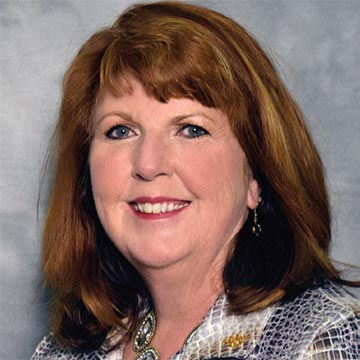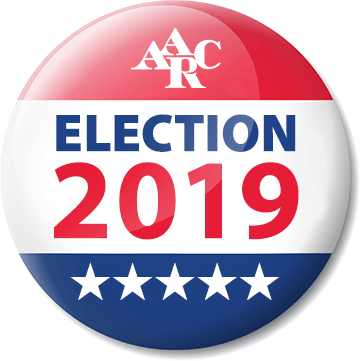Director-at-Large
Debra Skees, MBA, RRT, CPFT
Mercy Hospital – Allina Hospitals and Clinics
Manager
Member Since: 1990
AARC Activities:
- AARC Board of Directors, Director-at-Large, 2016-present
- AARC Committee Memberships
- Finance Committee, 2009-2010
- Budget and Audit Committee, 2009-2010
- HOD, Past-Speaker, 2015
- Member of Management and Adult Critical Care Sections
HOD Activities:
- AARC HOD, Speaker-Elect, Speaker and Past-Speaker, 2013-2015
- Minnesota Society for Respiratory Care (MSRC), Delegate, 2006-2009, 2012
- AARC HOD, Treasurer, 2009-2010
- Chair, AARC HOD, Orientation Committee, 2007-2008
- Member, HOD Orientation Committee, HOD
- Delegate Assistance Committee, HOD Resolution Committee
- AARC Virtual Museum, 2014
Affiliate Activities:
- MSRC President-Elect, President, Past-President, 1995-1998
- MSRC Parliamentarian, 2009-2010
- Chair of the MSRC “F.U.N.” Committee
- Chair and co-founder of the Joint Executive Committee for the North Regional Respiratory Care Conference, 2004-2010
- Appointed to the BMP – Health Professionals Services Program Advisory Committee (past chair)
Related Organizations:
- North Regional Respiratory Care Conference – founding member, past chair of the Joint Executive Committee and Planning Committee Member
Education:
- AAS, North Hennepin Community College, Brooklyn Center, Minnesota
- BS, Metropolitan State University, St. Paul, MN
- MBA, Health Care Administration, Concordia University, St. Paul, MN
- CRT, RRT, CPFT
Publications:
- Utilizing Respiratory Therapists to Reduce Costs of Care. Ellen A Becker, Cheryl A Hoerr, Kimberly S Wiles, Debra L Skees, et al. Respiratory Care. January 2018, 63(1):102-117.
- MSRC Bronchus
- AARC HOD Record
Elections Committee Questions:
What AARC or Chartered Affiliate offices/positions have you held where you feel you made a significant contribution to our profession? What is the contribution and how will you apply it to your new position, if elected?
I am currently completing my term as director-at-large and continue to increase my knowledge of the strategies to advance the organization in support of its members and the care of the patients we serve. During this term, I participated in a strategy group to demonstrate the evidence in literature that shows the important role of RTs in reducing costs of care. I was a co-author on a systematic review article that was published based on this work and gave guidance for future research needed.
As past president of the Minnesota Society for Respiratory Care, I was instrumental in the formation of the North Regional Respiratory Care Conference (NRRCC), a joint venture between the MN and WI affiliates. This education conference attracted high quality nationally recognized speakers which elevated the content for attendees and at the same time improved the operating margin and revenue for both affiliates.
As Speaker of the House of Delegates, I believe I was able to improve effectiveness and efficiency to support the strategies and contributions of this advising body to the AARC.
What experience would you bring to the AARC to accomplish the goals set out by President Walsh?
Objective 7: Broaden consumer and health care providers’ knowledge and understanding of the value of respiratory therapists in providing safe, competent and evidence-based care.
It is my belief that achieving this objective will provide the foundation for positioning the respiratory therapist for the future. The reality is that Respiratory Therapy is STILL the best kept secret on the health care team, which is unfortunate because they are versatile and possess characteristics of both technical expertise and compassion that benefit patient care every day in a variety of ways. It is long overdue that the RT should be recognized as a key member of the health care team. Increasing the awareness and knowledge of the capabilities of the Respiratory Therapist will open doors of opportunity through which we can increase our contributions to quality patient care and health education.
Not only will patient care improve in effectiveness through expanded roles for the RT, but also the profession will gain strength in numbers as well as public recognition and career satisfaction.
What ideas do you have to attract non-members to join the AARC?
As a department manager, I will continue to highlight the benefits of the AARC to my staff and to the RT students of the affiliated clinical education programs. At affiliate educational meetings I will strive to connect with members and non-members alike to engage them in a way that is meaningful to them so they can share their unique contributions to benefit the profession. I also believe transparency in organizational performance to goals and strategies will demonstrate the value of the AARC to anyone that practices respiratory care.
Role-Specific Questions:
How would you, as a member of the AARC Executive Committee, work to move the profession forward based on the work done by our current and previous presidents?
I will continue to advance the organizational tactics to increase public awareness and policy access for respiratory therapists in all venues of patient care. Increasing visibility and credibility of the profession is mission critical. As a director, I will strive to showcase the work that the AARC does to support practitioners and engage RTs to contribute in a way that is meaningful to them.







